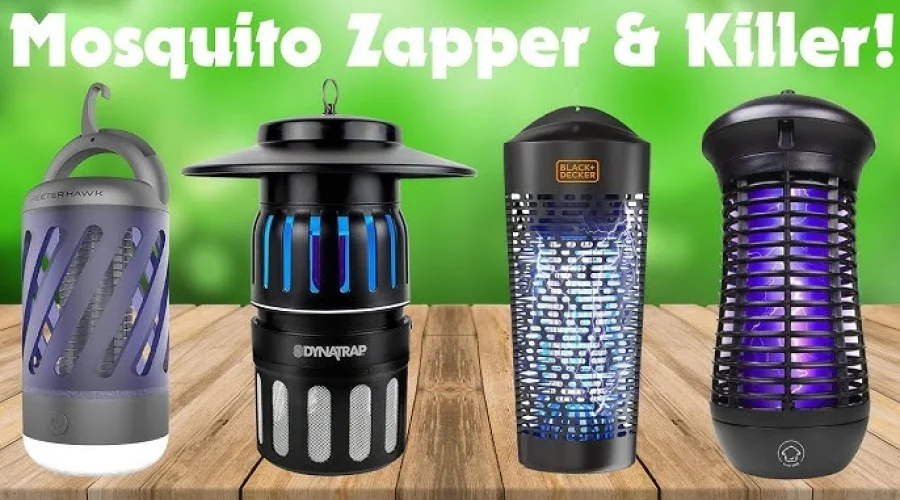What is a mosquito zapper?
A mosquito zapper is a gadget that kills flying insects such as mosquitoes and bugs. It works just like a bug zapper with a zapping mechanism powered by electricity. The zapper attracts pests with UV light and draws them into a grid that zaps (kills) them when they come in contact with the grid. Mosquito zappers are battery or plug-powered, which is highly convenient and safe in many situations and can be used in many ways. Most mosquito zapper models are small gadgets that can be carried easily. You can easily move them from an indoor to an outdoor place.
Also, there are very practical, handheld options like the mosquito zapper racket. This bug zapper racket gives you the option to zap mosquitoes by directly targeting them, zapping them when you’re ready. You also have options between an electric mosquito zapper racket and a zapper lamp. Either way, mosquitoes don’t stand a chance while you enjoy the outdoors or a less pest-infested environment. You can even use mosquito zapper bulbs that fit into standard light fixtures, with one fixture providing both light and pest control.
How do mosquito zappers work?
A mosquito is a straightforward yet effective device designed to attract and eliminate mosquitoes. It typically combines ultraviolet (UV) light and an electrified grid to lure and kill flying insects. The core mechanism of a mosquito zapper includes a UV light source, which emits wavelengths that are highly attractive to mosquitoes and other insects. These lights are often positioned in areas where mosquitoes are most active, such as patios, gardens, or near entrances.
To enhance effectiveness, many mosquito zappers are infused with a mosquito lure or pesticide that mimics human scent or releases carbon dioxide — signals that attract mosquitoes. When mosquitoes fly toward the UV light, they come into contact with the electrically charged metal grid surrounding the light source.
As soon as the mosquito touches the grid, it completes an electrical circuit and is instantly electrocuted. The result is a quick, chemical-free kill, making mosquito zappers a convenient option for pest control in both indoor and outdoor settings. Some models may also include collection trays for easy disposal of dead insects, and replaceable UV bulbs to maintain consistent performance over time.
What are the different types of mosquito zappers?
When it comes to keeping mosquitoes away, there are various mosquito-zapper types to choose from, each designed for specific needs and preferences. Whether you’re dealing with an indoor space or an outdoor space, there’s a mosquito-zapper suited for the job. Let’s explore the different types:
Solar Mosquito Zapper
A solar mosquito-zapper is a great, eco-friendly choice for outdoor use. It uses solar power, so it is battery-operated and rechargeable without needing an external power source. This zapper works well in your garden or backyard. It attracts mosquitoes with a mosquito attractant and zaps them with its electric grid. Plus, it’s compact and portable, making it easy to move around your yard.
Electric Mosquito Zapper Racket
The electric mosquito-zapper racket is a convenient, handheld solution. It’s designed for quick action, allowing you to swat mosquitoes in your path. You’ll hear the satisfying zapping sound when it delivers an electric shock to the pests. Ideal for those who prefer a more direct approach to mosquito management, it’s lightweight and portable, so you can take it anywhere.
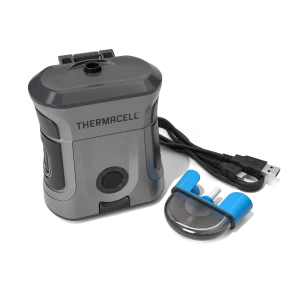
Rechargeable Mosquito Zapper
A rechargeable mosquito-zapper is great for those seeking both efficiency and convenience. This type is often battery-operated, offering flexibility for both indoor use and outdoor areas. It’s easy to clean. Plus, it doesn’t need constant battery replacements. This makes it economical and eco-friendly.
Commercial Mosquito Zapper
For larger areas or heavy mosquito problems, a commercial mosquito-zapper is a strong option. These models are made for outdoor use and can cover large spaces with their electric grid. They have a bigger mosquito attractant capacity, pulling in mosquitoes from farther away for better control.
Bug Mosquito Zapper
A bug zapper mosquito works like the others but also targets other flying insects. It has a grid that uses electric shock to kill mosquitoes and other pests quickly. This offers a safe, chemical-free way to manage insects.
Each type has its strengths, whether you want durability, portability, or an energy-efficient model. Whether you choose the natural energy of a solar mosquito-zapper or the convenience of a mosquito-zapper racket, you’ll find a model that suits your needs.
Are mosquito zappers effective against all types of mosquitoes?
Mosquito zappers can help to control mosquito populations around your property, but there are various factors involved. Typically, a mosquito zapper uses either ultraviolet light or a mosquito lure to attract flying insects, including mosquitoes, moths, and beetles. Not all species of mosquitoes are attracted by the same wavelengths of light. The effectiveness of specific brands of mosquito-zappers will vary according to the attractant used.
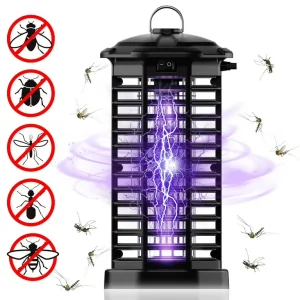
When considering the best mosquito zapper for you, you should also consider the size of the coverage area. Some mosquito-zappers can effectively cover larger spaces, while other are better for smaller coverage areas. Since mosquito-zapper models are reviewed, they also get mentioned in regard to the power source and reliability of the zapper.
Mosquito-zapper bulbs or mosquito-zapper lights may attract mosquitoes, but if the zapping unit is not strong enough, or the mosquito attractant (whatever it may be) is not good for the species of insect you want to kill, not all the pests that you get attract will be killed. To maximize your success, look for the mosquito-zappers that are proven to work for a variety of flying insects.
Why Should You Consider Using a Mosquito Zapper?
A mosquito-zapper can be a major help when it comes to insect control, particularly during warm months. These convenience devices are wonderfully effective against problematic mosquitoes, and simply solve indoor or outdoor enjoyment. If you want to relax without swatting mosquitoes, you should look into a good mosquito-zapper 2024. It attracts struggling mosquitoes with a mosquito lure and offers a strong zapper for creating a peaceful zone minus the harmful chemicals.
The best mosquito-zapper strikes an appropriate balance between efficiency and convenience. Whether you want an outdoor model or an indoor zapper, such as a solar mosquito-zapper, there are many options available. Indoor mosquito-zappers are often small and portable, making them easy to move and easy to clean. In fact, many come with battery lives long enough to keep your indoor living space free from flying insects for hours. Outdoor mosquito-zapper reviews, specifically for solar mosquito-zappers, are great for sustainable and eco-friendly pest management.
What are the benefits of using a mosquito zapper?
- Effective Insect Control: The mosquito-zapper attracts and zaps mosquitoes. This keeps your space pest-free.
- Reduces Mosquito Bites: A mosquito bite zapper lowers the chances of painful, itchy bites.
- Easy to Use: It’s simple to set up and operate the zapper, indoors or outdoors.
- Eco-Friendly Options: A solar mosquito-zapper is battery-powered and eco-friendly, ideal for outdoor areas.
- Wide Coverage: Many models cover larger spaces, boosting effectiveness against mosquitoes.
- Convenient: A mosquito-zapper racket is portable and easy to use, letting you target mosquitoes anywhere.
How do mosquito-zappers compare to other mosquito control methods?
A mosquito zapper effectively reduces mosquitoes. It utilizes UV light to draw in mosquitoes and zap them on contact. This means you can set it up and forget about it. Unlike sprays or insect repellents, it is low maintenance and is not stressful because it doesn’t require frequent reapplication.
When it comes to environmental considerations, a mosquito zapper is less harmful. It does not utilize dangerous pesticides or similar chemicals, and since sprays can harm the environment, they also require reapplication on a routine basis. The zapper uses a mosquito lure, so to use the zapper meant it requires no involvement and is truly passive.
Yes, the zap sound can be nerve-racking – but at least we know the unit is working. Typically, an electrical zapper will produce a sound and kill a mosquito, whereas other sprays and repellents are often silent places. Also, it is low maintenance. Unlike a spray that requires continuous attention while monitoring an environment for pests, the zapper provides a minimal upkeep option.
Can a mosquito-zapper help reduce the risk of mosquito-borne diseases?
Mosquito-borne illnesses such as malaria and dengue are serious threats, mainly in areas with mosquitoes. A mosquito-zapper is a solution to the problem. It can help attract mosquitoes, via light, and kill them upon contact. This type of action lowers the local mosquito population, diminishing the potential for disease transmission.
When considering the efficacy of mosquito-zappers, consider the area of where it is utilized. Outdoor mosquito-zappers can cover more area in comparison to indoor ones. Therefore, they are very useful for something like a garden or patio. When used with a mosquito attractant, outdoor mosquito-zappers can effectively attract mosquitoes. While they are not going to catch every mosquito, they are a useful element of insect control in reducing the number of pests near you as well as your potential for contracting a mosquito-borne disease.
How to Choose the Right mosquito zapper for Your Needs?
When trying to select the best mosquito-zapper, there are a number of considerations. First off, consider the coverage area. This ensures that your zapper will be able to cover your area effectively. The size of the zapper matters, whether you have a small patio or a huge yard, its effect will depend on the area size. If you like the idea of a zapper to use outdoors, the best solar mosquito-zapper is an option to consider because it embraces natural use and it’s eco-friendly.
Another factor to think about is the power source. Battery-operated zappers will give your zapper more versatility; where an electric model ultimately requires a plug-in power source and not as much convenience. For durability, make sure you evaluate the build and it’s materials, this is especially important for outdoor models subjected to tough weather. Some zappers use a lure on the mosquito lure to attract the insect before destroying it. Use combined with sincere readings of mosquito-zapper reviews will help you discover an effective mosquito-zapper.
Also be mindful of the user’s comments as it regards to the ease of use and cleaning side of the zapper. It is much easier to clean and maintain if the zapper is made with a removable tray and/or is easy to clean. Additionally, if you do not want to hear the “zap” or would just prefer less noise, even that is an option with some zapper models. All in all a well-rated mosquito-zapper will check all the boxes and give you a balance of power source, coverage area and durability makes it easy to make an investment that makes sense for the long technique.
What features should you look for in a mosquito zapper?
When selecting the best mosquito-zapper, pay attention to some important features that will help with performance. Looking at reviews on mosquito-zappers is a great start to see how well the products perform in the world.
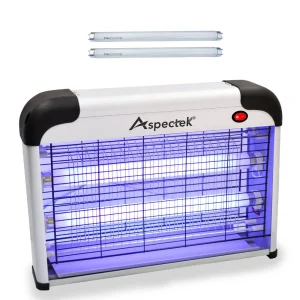
A strong UV light is a must in a mosquito-zapper. Mosquitoes are attracted primarily to the UV light and this allows them to use the light and guide them to the zapping action. A mosquito attractant can also be used to help the zapper attract pests.
Next, consider the power source. If you are eco-friendly, a solar powered mosquito-zapper is powered by the sun during the day, and doesn’t need to be recharged all night. A rechargeable mosquito-zapper will work a lot better in reliability along with savings on batteries. You have to also take into account how long the battery lasts for your long-term use. This is important if you want to use the zapper for long periods of time.
Furthermore, the two ultimate features to consider is the convenience of use and cleaning. You want to find a zapper that is easy to clean up after use. Also, consider the design itself and determine if it is user-friendly. These details may seem insignificant, but they will involve your satisfaction over the long-term.
What is the price range for different mosquito zappers?
When you start looking at mosquito zappers, you will soon notice that the mosquito-zapper prices vary widely. This variation is due to factors such as effectiveness, durability, and power. Most would probably want to find a mosquito-zapper that has good value for its price. Preparatory to zappers can be found in the lower-cost level, beginning at about $20. However, you can find the best mosquito-zappers under can hit the $100 mark, or more for select brands or models.
mosquito-zapper prices typically tell you whether it will require electric power or if it needs mosquito attractant. More expensive zappers will likely have typically features with options such as UV light, adjustable positions, more power and other regards. Generally these features help the zapper attract and kill mosquitoes better. The best way to know which mosquito-zapper you can get that will give the best value for the money is to consult mosquito-zapper reviews.
Where Should You Place Your mosquito zapper?
Choosing the right location for your mosquito-zapper is vital for its ability to work properly. Choosing a suitable location for your zapper is key to achieving the absolute most it offers. Always select a location that has the potential to cover the most outdoor space possible. Mosquitoes will be attracted to a mosquito attractant, such as light and carbon dioxide. Therefore, place the zapper in the position with the strongest presence of these attractants, so that you can entice mosquitoes to the zapper. The zapper should be out of strong wind currents and where you will be actively spending time outdoors.
When setting up, be sure to place the zapper near a power source and at the height that mosquitoes are generally flying. This will help the zapper cover the biggest area for coverage and an effective coverage area for flying insects. When determining your position, consider what is convenient for you. Don’t place the zapper too far from your activity, but also consider that you do not want to place the zapper on your relaxing posture. Finding the balance between position and accessibility is crucial to helping you maximize the desired results you want from your zapper.
What locations are most effective for mosquito zapper placement?
When considering where to place your mosquito-zapper, it is important to find the right locations. The secret to controlling mosquitoes is determining the appropriate mosquito-zapper locations based on the coverage area. Placing a mosquito-zapper on the outdoors is ideal in areas that mosquitoes congregate, such as a location with an abundance of green. Mosquitoes will be attracted from all areas to the mosquito-zapper’s mosquito attractant.
For insect zappers that are used inside, place the unit as close as possible to open windows or doors where insects tend to manifest. Be cautious of the power outlet such that it is not difficult to obtain access to. If there are obstructions such as furniture or another item to way the mosquito-zapper location, remove them. In particular, placing it as close as possible to areas that draw lots of attention to mosquitoes, such as lights or food, is going to make it more successful at keeping your home or yard mosquito free. If you follow a mosquito-zapper placement guide, you are going to be using it more efficiently.
How far should you position your zapper from your outdoor activities?
Use the mosquito-zapper with intent outside, placing it in a strategic location outside for maximum efficacy. Generally, place the zapper 10 to 15 feet away from where the people are. The added distance not only helps to allow the zapping mechanism to strike mosquitoes, but it also allows you to keep the buzzing noise of the zapper away from you.
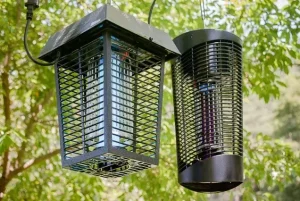
Plan for the area needed to be covered, when deciding on a location for an outdoor mosquito-zapper. The zapper will work effectively within the area of mosquitoes attracted to its mosquito attractant. A helpful suggestion is to place the zapper in an area and position where there is little wind and few obstructions. This will allow the zapper to attract effectively from a larger area without effecting your activities. Taking time to select the best distance and location will make all the difference to enhancing your enjoyment of the outdoors, without the annoyance of mosquitoes.
Are there any common mistakes to avoid when placing a mosquito zapper?
When positioning a mosquito-zapper, there are various possible errors which may impede its performance. One of the most common errors related to mosquito-zappers is incorrect positioning.
One of the most crucial features of where you position a mosquito-zapper is to position it for coverage and to keep the zapper away from barriers that might impede coverage. Ideally, you want the zapper positioned where there are no walls or trees where the mosquito attractant is unable to achieve it’s best coverage possible. Failure to do so will cause missed mosquitoes. You also want to keep the zapper away from bright lights and strong air currents, as they will confuse insects, thus detracting or decreasing the effectiveness of the unit.
Follow these easy mosquito-zapper placement tips to help the operation of your mosquito-zapper perform at its best. Position the zapper in an open area, away from bright lights. Give it lots of space without restricting it’s performance. In addition, refer to a mosquito-zapper guide to setup the zapper properly to achieve the largest coverage area, even beyond barriers. Position the zapper near water or other covered vegetation.
How to Maintain Your Mosquito Zapper?
Keeping your mosquito-zapper maintained is important for long-term usability. Regular maintenance will help you avoid problems such as lessening effectiveness and excessive debris. As a rule, you should always be cleaning your device when you see clogged dead mosquitoes or debris. You should also check the power source to make sure the zapper has power and is working correctly. If the zapper has an option for a mosquito attractant, you should also replace that regularly to maintain better efficiency in attracting mosquitoes.
Part of proper mosquito-zapper maintenance means checking the electrical parts of the zapper as well. Pay attention to the zap noise it makes. When you hear the “zap” noise while using the zapper, you should know it is in working order. You should inspect the exterior and interior device to ensure it is not breaking apart and will last long. Good maintenance will lead to a longer-lasting mosquito-zapper and more effective mosquito control.
What regular maintenance is required for optimal performance?
Regular mosquito zapper maintenance is essential to ensure it will be working at its optimal performance. First, the main aspect of maintaining the zapper is to clean it! Like all machines, debris and dead mosquitoes will build up in the zapper over time, affecting how effectively it works. When cleaning it, simply wipe the grid and remove any built up debris from the zapper. It’s also important to regularly check the power source to ensure the zapper will work properly. A properly maintained mosquito-zapper can expect to perform reliably up to the very best performance.
Another key aspect of mosquito-zapper maintenance is to ensure the longevity of the device. You should inspect the devices enclosure and other aspects to ensure no wear damage is present. Any obvious signs of wear or deterioration can warrant replacing parts as it’s required. This simple, proactive mosquito-zapper maintenance will help prolong the life of the device and will have it functioning at higher efficiency for the duration of their season.
How often should you clean your mosquito zapper?
Cleaning your mosquito-zapper regularly is key to its effectiveness. A mosquito-zapper cleaning schedule helps maintain performance, especially after weeks of use. Clean it at least once a month, or more often if you live in a high mosquito area.
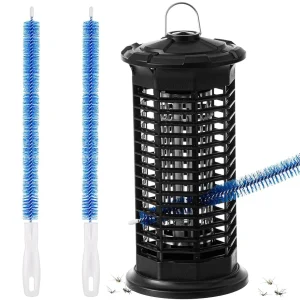
First, unplug the mosquito-zapper from its power source. Then, use a brush to gently remove bugs from the grid. This will also make the zapping sound quieter, as dirt and insect remains can clog the zapper. Regular maintenance keeps the device efficient, so stick to your clean mosquito-zapper routine to keep it in great shape.
What should you do if your mosquito zapper stops working?
If your mosquito-zapper stops working, don’t panic. There are a few simple mosquito-zapper troubleshooting steps you can follow to get it back in action. First, check if the zapper is plugged in and connected to a reliable power source. Sometimes, loose connections or a faulty electric outlet could be the problem.
If the zapper is on but not working, check the bulb or UV light. It might be burned out. If the zapper seems less durable, it may need repair or part replacement. After checking the power and light, if nothing changes, consider advanced fixes. If you’re not comfortable with repairs, contacting a pro is a smart choice. Simple troubleshooting often fixes the issue. However, for more complex repairs, getting help can save you time and money.
What Are the Myths and Misconceptions About Mosquito Zappers?
There are many false notions that exist about mosquito-zapper myths. One mosquito-zapper myth is that these zappers work only for mosquitoes .Mosquito zappers do kill other pests apart from mosquitoes, including moths, flies, and others. Mosquito zappers use UV light, which means that it will draw in more insects than just mosquitoes.
Another mosquito zapper myth is that it will eliminate all mosquitoes ownership in your back yard. Mosquito zappers can seem to reduce mosquitoes, but it is not a perfect solution as mosquitoes are also attracted to body heat, and some scents. Additionally, the area a zapper covers will not include all areas in your backyard. Mosquito zappers are effective to operate with mosquito attractants, natural mosquito repellents, and others, and would be the best overall approach to lower your backyard mosquito population.
It is important to understand how mosquito zappers operate. They target many pests, and they can work, with the caveat that people can come away thinking they work better than they do.
Are mosquito zappers harmful to other insects?
The zapping mechanism in many devices attracts flying insects like mosquitoes and flies. While these zappers control pests well, they can also catch other insects. This includes beneficial species like bees and moths, which are important for pollination.
The mosquito zapper’s harm may not be serious for less critical insects, but it can upset the natural balance. The bug zapper effects are especially clear in warmer months when more insects are out. I’ve seen that using a zapper in my garden not only eliminates mosquitoes but also decreases other flying insects. This shows that, though effective for pest control, the device has its downsides.
Do mosquito zappers attract more mosquitoes than they kill?
People often ask whether mosquito zappers attract more mosquitoes than they kill. Based on my experience, these devices are generally effective at controlling a host of insects, but it’s useful to know more about the efficacy of zappers in killing mosquitoes.
To kill a mosquito, a mosquito zapper has to attract the mosquito to an electric grid based on its light stimulus. Some users believe that while zapper devices might attract and kill a few mosquitoes, the zapper may attract more mosquitoes than the zapper kills and consequently increase the count of mosquitoes in the immediate vicinity. Zappers can still reduce mosquito density in the area around them, although the light source will likely already attract more mosquitoes than anticipated.
Based on my own use of a zapper, I see that zappers attract a lot of mosquitoes. The real question is how effective zapper devices are for mosquito control, since the efficacy is determined by not only the zapper’s location but also the intensity of the infestation. Check out Deep Dive Picks for curated insights and expert recommendations.
Conclusion
When addressing mosquito problems, finding the best mosquito zapper is essential for your outdoor space. A quality mosquito zapper ensures reliable mosquito zapper performance, which keeps your place free of mosquitoes and other outdoor pests. After being outdoors for years, I have learned that not all zappers are equal in function. Some function well in smaller spaces, whereas others can function in far larger spaces.
If you are looking for a zapper that is high-performing and easy to use, it is worthwhile to be on the lookout for a zapper with attractant features. Many zappers today have their built-in attractant features that will improve their mosquito attracting capabilities over the years. I have seen my outdoor comfort improve by using the proper mosquito zapper over the years in my backyard. It would be a good idea to read a mosquito zapper review for tips on what generally works for everyone else. Remember, the better the zapper you buy, the better the device will function when it comes to getting rid of buzzing outdoor pests.
FAQs
Do mosquito zappers work?
Mosquito zappers kill a small percentage of mosquitoes and other insects. But they don't control mosquito populations well and can hurt helpful insects.
What is the most effective mosquito zapper?
The Flow Tron Electronic Insect Zapper is considered the best overall. Other top choices include the Black Flag Bug Zapper for outdoor use and the JMQT Bug Zapper Light Bulb for indoor use.
What is the most effective mosquito killer for indoor use?
The Aspectek Indoor Insect Killer is great for indoor use, while the DynaTrap ½ Acre Decora Series Mosquito & Insect Trap offers the largest range for outdoor use.
Do mosquito zappers work?
Mosquito zappers kill a small percentage of mosquitoes and other insects. But they don't control mosquito populations well and can hurt helpful insects.
What is the most effective mosquito zapper?
The Flow Tron Electronic Insect Zapper is considered the best overall. Other top choices include the Black Flag Bug Zapper for outdoor use and the JMQT Bug Zapper Light Bulb for indoor use.
What is the most effective mosquito killer for indoor use?
The Aspectek Indoor Insect Killer is great for indoor use, while the DynaTrap ½ Acre Decora Series Mosquito & Insect Trap offers the largest range for outdoor use.
